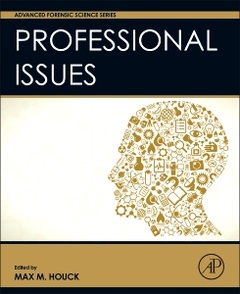Description
Professional Issues in Forensic Science
Advanced Forensic Science Series
Coordinator: Houck Max M.
Language: English
Subject for Professional Issues in Forensic Science:
Support: Print on demand
Description
/li>Contents
/li>Biography
/li>Comment
/li>
Professional Issues in Forensic Science will introduce students to various topics they will encounter within the field of Forensic Science. Legal implications within the field will focus on expert witness testimony and procedural rules defined by both legislative statute and court decisions. These decisions affect the collection, analysis, and court admissibility of scientific evidence, such as the Frye and Daubert standards and the Federal Rules of Evidence. Existing and pending Forensic Science legislation will be covered, including laws governing state and national DNA databases. Ethical concerns stemming from the day-to-day balancing of competing priorities encountered by the forensic student will be discussed. Such competing priorities may cause conflicts between good scientific practice and the need to expedite work, meet legal requirements, and satisfy client?s wishes. The role of individual morality in Forensic Science and competing ethical standards between state and defense experts will be addressed. Examinations of ethical guidelines issued by various professional forensic organizations will be conducted. Students will be presented with examples of ethical dilemmas for comment and resolution. The management of crime laboratories will provide discussion on quality assurance/quality control practices and the standards required by the accreditation of laboratories and those proposed by Scientific Working Groups in Forensic Science. The national Academy of Sciences report on Strengthening Forensic Science will be examined to determine the impact of the field.
Professional Issues in Forensic Science is a core topic taught in forensic science programs. This volume will be an essential advanced text for academics and an excellent reference for the newly practicing forensic scientist. It will also fit strategically and cluster well with our other forensic science titles addressing professional issues.
Professional Issues in Forensic Science
*Please note all sections will include Key Terms, Review Questions, Discussion Questions and Additional Readings
Section 1: Introduction Section 2: Analysis Section 3: Management Issues Section 4: Accreditation and Certification Section 5: Education and Training Section 6: Legal Issues Section 7: Professional Organizations and Groups
Widely published, Houck has dozens of peer-reviewed journal articles and is the author and editor of numerous books. He is co-author of the best-selling Fundamentals of Forensic Science, Science of Crime Scenes, and Success with Expert Testimony, among others. He is the editor of the Advanced Forensic Science series of books. Houck is also founding co-editor of Forensic Science Policy and Management (the official journal of ASCLD), the only journal that addresses the management, policy, and administration of forensic science.
Houck has served on numerous committees, including for the National Academies of Science, NIST, Interpol, The Royal Society, the Director of the FBI, and the White House. He is a popular public speaker and has given presentations at NASA, the Max Planck Institute, an Oxford Roundtable, as well as keynote talks at numerous international conferences. Houck has taught at several universities, including West Virginia University and University of Tampa. His research topics include management, leadership, and policy implications for forensic organizations.
Houck has a Bachelors and Masters degree in anthropology from Michigan State University. He received his Ph.D. in Applie
- Introduces readers to various topics they will encounter within the field of Forensic Science
- Covers legal issues, accreditation and certification, proper analysis, education and training, and management issues
- Includes a section on professional organizations and groups, both in the U.S. and Internationally
- Incorporates effective pedagogy, key terms, review questions, discussion question and additional reading suggestions
These books may interest you

Forensic Uses of Digital Imaging 87.11 €



